Serving as long distance caregiver for parents in their 90s (for 2.5years) has given me such an emotional roller coaster ride. Sometimes I feel like my emotions are ping ponged around as I take one step forward and two steps back.
I experience such emotional highs and lows that I often don’t recognize myself.
Common emotional states that I bounce around are:
denial to acceptance
fear to hope
uncertainty to knowing
disgust to compassion
disillusionment to maturity
anger to forgiveness
depression to healthy grieving
anxiety to serenity
Sometimes my only respite is feeling numbness.
This visit bombarded me with countless “ping-ponging” moments.
--First, I met with funeral directors to explore pre-arranging funerals for my invalid parents who are in hospice.
--Then, I met with church officials to discuss funeral guidelines.
--Next, I met with obituary program printers to finalize program materials including scanning of photos and finalizing slide show/video show. I left a deposit. Of note, I began working on my mom’s obituary booklet two years ago, when the doctor told me repeatedly she was in critical condition.
--I spoke with several of Mom and Dad’s church friends and club members to gather input in to planning special funeral ceremonies. Of note, when I returned home, several of them had left messages on my answering machine.
--I located my Dad’s military discharge papers to help procure a flag for his ceremony. I've been told I will also be able to get a military grave marker. The funeral director says they will send out soldiers to fold his flag at the cemetery.
--I met with the funeral director I will use and she gave me quotes for a double funeral as well as individual funerals. I felt very protected by her and trust her implicitly. We attended the same grammar school and she is now president and CEO of the family business. She insisted that in addition to planning individual funerals, that we plan a double funeral. In her experience there is a great likelihood this will be the case.
--I notified all the caregivers of the funeral director to be contacted in case of emergency.
--I finally met the hospice physician. She came by to analyze my mother's open skin wounds.
--I spoke with a dear grade school and high school friend for hours. She came to visit us and she recommended the funeral director I selected.
--The hospice minister came by to visit my parents.
--I saw my parents come to life when a good church friend brought her poodles by for a visit.
--I met the CNA who bathes Dad twice a week.
--I met a substitute nurse who came to check on my parents.
--I selected caskets, flowers (white roses), musician, and outfits.
--Before I left, I set aside outfits for both mom and dad.
--I contracted pest control service. I was here while she ferreted out the problem.
--I found life insurance policies and contacted the underwriting company to determine the status.
--I hired repairmen to fix the clothes dryer.
--I bought my parents new comforter sets. The old ones had worn out.
--I agreed to sell the other car. It is possible that one of the caregivers will purchase it from us. It is a 94 Buick that has only 28,000 miles.
--I had good, long talks with all 4 caregivers.
--I made my parents room more senior friendly by moving more items down to the basement. Now, the door swings open and freely, and there is more room to maneuver.
--I was able to witness my dad finally using the portable commode.
--I created a plan of next steps in case of “emergency”. First on the list is contacting Reverend Miller at the church to determine his availability to perform a funeral.
--I paid bills and handled all correspondence.
--I gave emergency contact info for when I go to India (September 19-October 1).
--I was told my Dad is still officially in hospice because of his heart. Mom does not qualify.
--I got prescriptions refilled.
--I bought my Dad new slippers. (Actually, I bought them in Miami; the adjustable kinds with Velcro closures are difficult to find.
-- I arranged for my dad's name to be added to the weekly prayer list at St. Dorothy's. Mom's name has been listed weekly for 2 1/2 years.
--I bought a new cake that my Dad likes and eats daily now.
I feel serene knowing I have attended to the present and planned for the inevitable.
For now, my emotions are in check.
Friday, August 31, 2007
Friday, August 24, 2007
I went to pre-arrange funerals today
The funeral director told me I was the most organized client she’s ever met.
Friday, August 17, 2007
Senior Humor Website
Here is a website that provides some senior humor and some thought-provoking material. Enjoy!
http://www.sticksite.com/oldfolks.htm
http://www.sticksite.com/oldfolks.htm
My 94-year old Dad has needs
Charlotte informed me all the caregivers overhear Dad calling Mom to his bedside to inform her he has needs. He wants Vivian to leave the bars down on her hospital bed.
Even though my Dad’s arthritis causes severe pain, his libido has not diminished.
Even though my Dad’s arthritis causes severe pain, his libido has not diminished.
Friday, August 10, 2007
Letter Asking For Help!
Dear Ernestine August 10, 2007
I am writing to ask for your help. You are one of my mom's oldest and dearest friends.
As difficult as it is to face reality, I am trying to do what’s best by planning my Mom’s end of life services now. I will make much better decisions if I make them now while I have a clear mind rather than waiting until I am grieving. Both Mom and Dad are under the care of hospice.
I would like you to play a role. Specifically, would you be willing to speak about my mom for two to four minutes during the funeral or wake service? You could simply jot down one of your most favorite memories and then talk about it briefly.
I am planning some combination of a funeral at St. Dorothy's, a viewing at a funeral home, and the burial at Burr Oak Cemetery. I know absolutely nothing about funerals and I have avoided them ever since I lost my sister back in May 1983. I am doing as much research as possible now.
I am asking you in advance so you will have some time to formulate your thoughts.
Also, who else do you think I should ask?
I would appreciate any thoughts you have about all this. You have known my mom very well---for more than 50 years!!!!!!!!
Thank you in advance for your support!
I have been coming to town every month to oversee all my parents’ affairs. As you know, I hired a staff of round-the-clock caregivers. I know you have met several of them.
Love Always,
Karla Scott.
I am writing to ask for your help. You are one of my mom's oldest and dearest friends.
As difficult as it is to face reality, I am trying to do what’s best by planning my Mom’s end of life services now. I will make much better decisions if I make them now while I have a clear mind rather than waiting until I am grieving. Both Mom and Dad are under the care of hospice.
I would like you to play a role. Specifically, would you be willing to speak about my mom for two to four minutes during the funeral or wake service? You could simply jot down one of your most favorite memories and then talk about it briefly.
I am planning some combination of a funeral at St. Dorothy's, a viewing at a funeral home, and the burial at Burr Oak Cemetery. I know absolutely nothing about funerals and I have avoided them ever since I lost my sister back in May 1983. I am doing as much research as possible now.
I am asking you in advance so you will have some time to formulate your thoughts.
Also, who else do you think I should ask?
I would appreciate any thoughts you have about all this. You have known my mom very well---for more than 50 years!!!!!!!!
Thank you in advance for your support!
I have been coming to town every month to oversee all my parents’ affairs. As you know, I hired a staff of round-the-clock caregivers. I know you have met several of them.
Love Always,
Karla Scott.
Benefits of Funeral Preplanning
Procrastination has ruled my behavior when it comes to planning my parents' funeral, their wake, finalizing cemetery arrangements, writing an obituary, choosing eulogists etc. Why? because of all the complex emotions surrounding death, grieving, my ignorance of funerals, vulnerability, and mostly fear I will make wrong decisions because I am the sole decision maker.
Because of the recent string of close calls with my Mom, I have resumed activities (I began two years ago when my Mom was critical) of funeral planning.
I wrote my Moms obituary program, I pulled out the DVD with videos and photos (I did this work two years ago), I contacted casket manufacturers, funeral brokers, the cemetery, and funeral homes. I have also consulted with close friends of my Mom and several of my close friends.
Although my panic and feelings of being overwhelmed still run high, I take comfort in knowing I am taking action steps.
My Next Steps:
Choose funeral home
Consult with funeral home director
Formalize plans
Make funds available
Leave a deposit with funeral home. Prepay at today's prices.
Begin paying cemetery fees of opening/closing plots and for concrete liners ($1510 per person)
Order and pay for caskets online (500% savings)
Contact St Dorothy’s church
Choose eulogist
Find caterer
Select flowers and music
Form a team to help me carry this out.
Here are helpful notes about funeral preplanning that I found online from The Preplanning Network.
Since mortality faces us all, the importance of preplanned arrangements should be emphasized. Preplanned arrangements spare survivors the burden of having to make decisions and incurring expenses on your behalf during their time of grief. Most importantly, planned arrangements ensure that your wishes are fulfilled. Historically death has been a taboo subject that people attempt to avoid until they are faced with the responsibility of making arrangements for the disposition of a deceased family member or friend. Making arrangements for disposition at the time of need can prove to be a difficult and an often unnecessarily expensive proposition.
Benefits of planning NOW!!
---You can beat inflation by locking in a price now. Why pay more down the road for the same products and services?
---You make decisions with the head vs. the heart. When you are under the strain of grief, you are vulnerable to making bad decisions and overspending.
---You can make decisions together. You can incorporate the wishes of your loved one and you can involve all family members. Never make lonely, hasty decisions.
---You can pay over time from earnings vs. an immediate cash outlay from savings
Because of the recent string of close calls with my Mom, I have resumed activities (I began two years ago when my Mom was critical) of funeral planning.
I wrote my Moms obituary program, I pulled out the DVD with videos and photos (I did this work two years ago), I contacted casket manufacturers, funeral brokers, the cemetery, and funeral homes. I have also consulted with close friends of my Mom and several of my close friends.
Although my panic and feelings of being overwhelmed still run high, I take comfort in knowing I am taking action steps.
My Next Steps:
Choose funeral home
Consult with funeral home director
Formalize plans
Make funds available
Leave a deposit with funeral home. Prepay at today's prices.
Begin paying cemetery fees of opening/closing plots and for concrete liners ($1510 per person)
Order and pay for caskets online (500% savings)
Contact St Dorothy’s church
Choose eulogist
Find caterer
Select flowers and music
Form a team to help me carry this out.
Here are helpful notes about funeral preplanning that I found online from The Preplanning Network.
Since mortality faces us all, the importance of preplanned arrangements should be emphasized. Preplanned arrangements spare survivors the burden of having to make decisions and incurring expenses on your behalf during their time of grief. Most importantly, planned arrangements ensure that your wishes are fulfilled. Historically death has been a taboo subject that people attempt to avoid until they are faced with the responsibility of making arrangements for the disposition of a deceased family member or friend. Making arrangements for disposition at the time of need can prove to be a difficult and an often unnecessarily expensive proposition.
Benefits of planning NOW!!
---You can beat inflation by locking in a price now. Why pay more down the road for the same products and services?
---You make decisions with the head vs. the heart. When you are under the strain of grief, you are vulnerable to making bad decisions and overspending.
---You can make decisions together. You can incorporate the wishes of your loved one and you can involve all family members. Never make lonely, hasty decisions.
---You can pay over time from earnings vs. an immediate cash outlay from savings
Wednesday, August 8, 2007
Forgiveness
The message of forgiveness appears often in my life lately and has inspired me to research this spiritual principle. In processing the data froml my search, what I have I realized is that my actions towards my parents demonstrate that I am already forgiving them. Their controlling and often critical manner over the years caused me lots of pain. As an adult, I have the choice to let go of the negative thoughts and replace them with positive loving, compassionate ones. I acknowledge that they did their best as parents, only wanting the best for me.
Yesterday, a good friend shared with me a definition of forgiveness that surpasses all the rest: it is simple, it is accurate, and it is easy to apply.
Forgiveness is remembering only the good.
When I hear this definition, I am instantly catapulted down memory lane to my childhood where fond, loving memories abound.
After my parents adopted us, they hired a full-time live-in nanny to take care of us. They gave up their bedroom for seven years. So the nanny would have a place to live.
Every year, we had two Christmas trees filled with all the toys on our list and other items that we needed.
Every year, our dad decorated the house from top to bottom for all the key holidays, including Christmas, Easter, and July 4. Dad died our Easter eggs every year; he wrapped Christmas presents; and he strung Christmas lights and other Christmas decorations outside our two-story house. Our house was always the prettiest one on the block.
Dad built us a tree house in our backyard.
One of my common questions was what's next, mommy. We had active lives as children with weekends that included picnics, amusement parks, museums, trips to the beach, birthday parties, and trips to Disneyland. I always trusted mom to have a busy fun-filled schedule for us.
These are just some of the fond memories I have of my parents growing up.
Here is an article about forgiveness that actually provides 10 actions steps on how to take this important spiritual principle seriously.
How to Forgive: 10 Guidelines
By Victor M. Parachin, ordained minister, speech writer, and author of ten books on prayer, healing, and relationship health.
As poet Edwin Markham approached his retirement years, he discovered that the man to whom he had entrusted his financial portfolio had squandered all the money. Markham's dream of a comfortable retirement vanished. He began to brood over the injustice and the loss. His anger deepened. Over time, Markham's bitterness grew by leaps and bounds. One day while sitting at his table, Markham found himself drawing circles as he tried to soothe the turmoil he felt within. Finally, he concluded: "I must forgive him, and I will forgive him." Looking again at the circles he had drawn on the paper before him, Markham wrote these lines:
He drew a circle to shut me out, Heretic, rebel, a thing to flout; But love and I had the wit to win, We drew a circle to take him in.
Although Markham wrote hundreds of poems contained in many book volumes, the words he wrote while forgiving are his most popular and memorable. As he forgave, a tremendous act of creativity was released within Markham. The poets and mystics among us have long known and declared that the act of forgiveness releases great healing power.
Author and minister Charles Fillmore recommended forgiveness as the most effective way of restoring inner harmony and balance: "There is a mental treatment guaranteed to cure every ill that flesh is heir to: Sit for half an hour every night and forgive everyone against whom you have any ill will or antipathy," he wrote.
While forgiveness has always been an important concept in religion and ethics, only recently have psychologists begun to discover its powers as a psychotherapeutic tool. In three separate studies, people who had not resolved the wrongs done to them - college students, elderly women, and incest survivors - all improved when therapists helped them learn to forgive. Although an increasing number of counselors recommend that we forgive those who have hurt us, many people find forgiveness difficult to offer. Here are 10 guidelines to help extend forgiveness and ease resentment.
Yesterday, a good friend shared with me a definition of forgiveness that surpasses all the rest: it is simple, it is accurate, and it is easy to apply.
Forgiveness is remembering only the good.
When I hear this definition, I am instantly catapulted down memory lane to my childhood where fond, loving memories abound.
After my parents adopted us, they hired a full-time live-in nanny to take care of us. They gave up their bedroom for seven years. So the nanny would have a place to live.
Every year, we had two Christmas trees filled with all the toys on our list and other items that we needed.
Every year, our dad decorated the house from top to bottom for all the key holidays, including Christmas, Easter, and July 4. Dad died our Easter eggs every year; he wrapped Christmas presents; and he strung Christmas lights and other Christmas decorations outside our two-story house. Our house was always the prettiest one on the block.
Dad built us a tree house in our backyard.
One of my common questions was what's next, mommy. We had active lives as children with weekends that included picnics, amusement parks, museums, trips to the beach, birthday parties, and trips to Disneyland. I always trusted mom to have a busy fun-filled schedule for us.
These are just some of the fond memories I have of my parents growing up.
Here is an article about forgiveness that actually provides 10 actions steps on how to take this important spiritual principle seriously.
How to Forgive: 10 Guidelines
By Victor M. Parachin, ordained minister, speech writer, and author of ten books on prayer, healing, and relationship health.
As poet Edwin Markham approached his retirement years, he discovered that the man to whom he had entrusted his financial portfolio had squandered all the money. Markham's dream of a comfortable retirement vanished. He began to brood over the injustice and the loss. His anger deepened. Over time, Markham's bitterness grew by leaps and bounds. One day while sitting at his table, Markham found himself drawing circles as he tried to soothe the turmoil he felt within. Finally, he concluded: "I must forgive him, and I will forgive him." Looking again at the circles he had drawn on the paper before him, Markham wrote these lines:
He drew a circle to shut me out, Heretic, rebel, a thing to flout; But love and I had the wit to win, We drew a circle to take him in.
Although Markham wrote hundreds of poems contained in many book volumes, the words he wrote while forgiving are his most popular and memorable. As he forgave, a tremendous act of creativity was released within Markham. The poets and mystics among us have long known and declared that the act of forgiveness releases great healing power.
Author and minister Charles Fillmore recommended forgiveness as the most effective way of restoring inner harmony and balance: "There is a mental treatment guaranteed to cure every ill that flesh is heir to: Sit for half an hour every night and forgive everyone against whom you have any ill will or antipathy," he wrote.
While forgiveness has always been an important concept in religion and ethics, only recently have psychologists begun to discover its powers as a psychotherapeutic tool. In three separate studies, people who had not resolved the wrongs done to them - college students, elderly women, and incest survivors - all improved when therapists helped them learn to forgive. Although an increasing number of counselors recommend that we forgive those who have hurt us, many people find forgiveness difficult to offer. Here are 10 guidelines to help extend forgiveness and ease resentment.
1. Educate yourself about forgiveness. "Forgive," according to Webster's New World Dictionary, means: "to give up resentment against or the desire to punish; pardon; to overlook an offense; to cancel a debt." Thus, the goal of forgiveness is to let go of a hurt and move ahead with life. Visit a library and research books or magazine articles on forgiveness so that you understand the difference between healthy and unhealthy forgiveness. For example, Robert Enright, Ph.D., an education psychologist at the University of Wisconsin-Madison, stresses that true forgiveness is not:
Forgetting. If the hurt wounded you enough to require forgiveness, you may always have a memory of it.
Excusing or condoning. The wrong should not be denied, minimized, or justified.
Reconciling. You can forgive the offender and still choose not to reestablish the relationship.
Weakness. You do not become a doormat or oblivious to cruelty.
2. Spend a few minutes each day cleaning out your thinking. At a local florist shop I once watched the owner remove tiny bugs from a potted plant. Using a cotton swab he meticulously plucked off one small tenaciously clinging offender after another. Although that tedious process took him several hours of silent concentration and steady work, he was able to rid the plant of what would ultimately stunt its growth and ruin its loveliness. There is a lesson from that florist which applies to daily living. The only way to keep ourselves free from the infestation of troublesome thoughts is to spend a few minutes each day cleaning out our thinking.
Has someone hurt you by his or her comments? Were you publicly insulted by someone? Did a friend fail to come through for you? Pluck off each offending layer of thought and dispose of it just as the florist disposed of the tiny insects destroying his lovely plant. Doing so insures that a vague irritation does not transform itself into a deep resentment and an intense hatred.
3. Practice on small hurts. To become a generous forgiver of major pains, practice forgiveness on small hurts. Forgive immediately the small slights inflicted by strangers - a rude clerk, a driver who cut you off, a doctor who keeps you waiting and waiting, etc. Use those events as practice time to prepare you for the tougher task of forgiving major hurts.
4. Challenge the "shoulds" in your thinking. Forgiveness is much easier when you give up the irrational belief which fuels your frustration, anger, and hostility - the expectation that other people will always act in the way you want. Beware of the "shoulds" in your thinking and speaking:
He shouldn't have done this to me.
She shouldn't act that way.
My daughter should have known better.
My son should be more attentive to me.
I've worked hard and I should have been rewarded.
Whenever you find the word "should" in your mind and talk, challenge yourself. Tell yourself it is unrealistic to expect that people will always act decently and respectfully toward you. Remind yourself that everyone is fallible and capable of making a mistake.
5. Understand that resentment has a high price tag. "Holding a grudge takes mental, emotional, and physical energy. It makes you obsessive, angry, and depressed," observes Barry Lubetkin, a psychologist and director of the Institute for Behavior Therapy in New York City. "There's a strong connection between anger and a wide spectrum of health miseries - chronic stomach upset, heart problems, and skin conditions among them. Without question, the more anger we experience within, the more stress we're under," he adds. Whenever a hostile or hateful thought enters your mind, try to be fully aware of the harm that resentment can do to you, even making you ill. Let that knowledge further motivate you to forgive and let go.
6. Remember: Lack of forgiveness is giving others power over you. Withholding forgiveness and nursing resentment simply allow another person to have control over your well-being. It is always a mistake to let such negative emotions influence your living. Forgive, and you will be able to direct your life in positive thoughts and actions. An excellent example is that of educator Booker T. Washington (1856-1915). An emancipated slave who started out living in abject poverty, he had to work from the age of nine to help support his family. Instead of becoming bitter about the hardships he faced and viewing himself as a victim, Washington worked hard to improve his situation. He first became a janitor in a school to obtain his education. Then he went on to teach at Hampton Institute, one of the first African-American colleges in the U.S. Later he organized and became president of Tuskegee Institute in Alabama. "I shall allow no man to belittle my soul by making me hate him" was Washington's lifelong motto.
7. Recognize the ripple effect of harboring a grudge. When you can't forgive someone, there can be a ripple effect which negatively infects your family and friends. Writing to advice columnist "Dear Abby," a woman says: "I have something to say to the millions of families whose lives are affected by divorce. An unforgiving and bitter person who has not let go of animosities can poison an entire family and ruin the holidays for everyone. I know. I was that person." The writer, who signs herself as "Free in Vermont," explains she could not forgive her former husband and his new wife, and her children suffered her ensuing bitterness. "One day after a particularly harsh outburst, I understood the pained reaction on my children's faces. I prayed for the strength to change my ways so that I could stop hurting those I love most in the world." Although it was difficult for "Free in Vermont" to extend forgiveness, she did so and says:
"I have peace in my heart and my children are happy. They are free to enjoy both homes." Forgiveness is a priceless gift which you can give to yourself and your family.
8. Bury the grudge - literally. Write a letter to the person who hurt you but don't mail it. Express fully, clearly, honestly how you feel and why that person's act hurt you and made you angry. Conclude with the bold declaration that you have forgiven him or her. Then, bury the letter in a potted plant or somewhere in your yard. This is a powerful symbolic exercise which many people have found to be extremely therapeutic.
9. Try instant forgiveness. Lewis Smedes, a professor of ethics at Fuller Theological Seminary, Pasadena, California, and author of Forgive and Forget: Healing the Hurts We Don't Deserve, tells of his rage toward a police officer who brutalized his young son, John. The officer was a large 250-pound lawman who assaulted his 140-pound son and then charged him with resisting an officer. Although the charge was quickly dismissed, Smedes's rage and hostility were not so quickly appeased. Realizing that his intense feelings toward the police officer were creating a personal emotional crisis, Smedes knew he had to find a way of forgiving.
"I tried a technique that everything in my temperament resisted," he writes. "I thought about how a priest gives instant absolution to a penitent, right off the bat, in the confessional booth. And I decided to give this cop absolution. 'In the name of God I hereby forgive you-go in peace,' I said out loud, at least six times. It worked enough to get me going. I felt myself pried a couple of inches off my hate. And I was on my way."
10. Recall repeatedly this one vital fact: forgiveness is a gift you give yourself. A former inmate of a Nazi concentration camp was visiting a friend who shared the ordeal with him.
"Have you forgiven the Nazis?" he asked his friend.
"Yes."
"Well, I haven't. I'm still consumed with hatred for them," the other man declared.
"In that case," said his friend gently, "they still have you in prison."
That story points out this reality: ultimately, forgiveness is a gift you give yourself. Bitterness and anger imprison you emotionally. Forgiveness sets you free.
Wednesday, August 1, 2007
Long Distance Travel Takes a Toll
Traveling Out of Town
Traveling to Chicago to oversee my parents care monthly can be quite exhausting. Although the flight itself lasts only three hours, the journey entails much more than a direct flight. A discussion follows.
Time Investment.
Here is a typical trip:
---leave home at 8 a.m.
---catch a 10 a.m. flight
---connect two hours later in another city.
---arrive Chicago O'Hare Airport at 4 p.m.
---wait an hour for the shuttle
---take the 1-hour shuttle to Midway Airport
---rent a car and drive home, arriving at 6 p.m.
Total travel time ranges from 9 to 12 hours each way-depending upon whether or not I take a direct flight, and depending upon airport delays.
Financial Investment.
Here are typical travel costs:
---Round-trip airfare averages $250
---round-trip taxi rides to the Miami airport is $50
---round-trip shuttle service from O'Hare Airport to Midway Airport is $30 (I used to pay $80 round-trip to travel from O'Hare to the south side)
---$200 for a five day rental car @$29 a day plus all taxes and fees (extra with daily insurance)
Total cost ranges from $500-$700 for each trip
It is a tall order, physically, mentally, financially, and time wise to travel monthly to Chicago.
It is the right thing to do.
Traveling to Chicago to oversee my parents care monthly can be quite exhausting. Although the flight itself lasts only three hours, the journey entails much more than a direct flight. A discussion follows.
Time Investment.
Here is a typical trip:
---leave home at 8 a.m.
---catch a 10 a.m. flight
---connect two hours later in another city.
---arrive Chicago O'Hare Airport at 4 p.m.
---wait an hour for the shuttle
---take the 1-hour shuttle to Midway Airport
---rent a car and drive home, arriving at 6 p.m.
Total travel time ranges from 9 to 12 hours each way-depending upon whether or not I take a direct flight, and depending upon airport delays.
Financial Investment.
Here are typical travel costs:
---Round-trip airfare averages $250
---round-trip taxi rides to the Miami airport is $50
---round-trip shuttle service from O'Hare Airport to Midway Airport is $30 (I used to pay $80 round-trip to travel from O'Hare to the south side)
---$200 for a five day rental car @$29 a day plus all taxes and fees (extra with daily insurance)
Total cost ranges from $500-$700 for each trip
It is a tall order, physically, mentally, financially, and time wise to travel monthly to Chicago.
It is the right thing to do.
Subscribe to:
Posts (Atom)
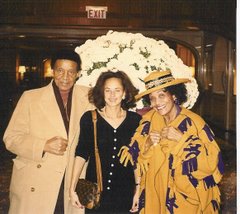

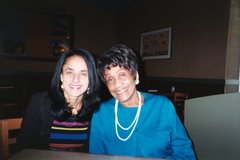



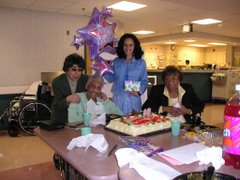
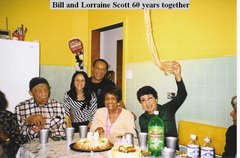
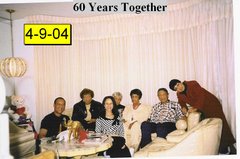
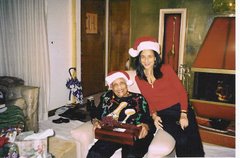
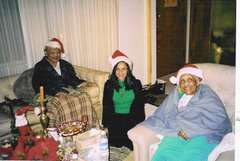
.jpg)